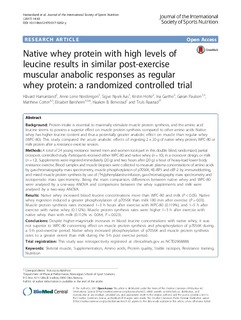| dc.contributor.author | Hamarsland, Håvard | |
| dc.contributor.author | Nordengen, Anne Lene | |
| dc.contributor.author | Aas, Sigve Nyvik | |
| dc.contributor.author | Holte, Kristin Tosterud | |
| dc.contributor.author | Garthe, Ina | |
| dc.contributor.author | Paulsen, Gøran | |
| dc.contributor.author | Cotter, Matthew | |
| dc.contributor.author | Børsheim, Elisabet | |
| dc.contributor.author | Benestad, Haakon Breien | |
| dc.contributor.author | Raastad, Truls | |
| dc.date.accessioned | 2018-01-31T09:39:33Z | |
| dc.date.available | 2018-01-31T09:39:33Z | |
| dc.date.issued | 2017-11-21 | |
| dc.identifier.citation | Journal of the International Society of Sports Nutrition. 2017, 14, 43 | nb_NO |
| dc.identifier.issn | 1550-2783 | |
| dc.identifier.uri | http://hdl.handle.net/11250/2480875 | |
| dc.description | This article is distributed under the terms of the Creative Commons Attribution 4.0 International License (http://creativecommons.org/licenses/by/4.0/), which permits unrestricted use, distribution, and reproduction in any medium, provided you give appropriate credit to the original author(s) and the source, provide a link to the Creative Commons license, and indicate if changes were made. The Creative Commons Public Domain Dedication waiver (http://creativecommons.org/publicdomain/zero/1.0/) applies to the data made available in this article, unless otherwise stated. | nb_NO |
| dc.description.abstract | Protein ingestion produces a strong anabolic stimulus that elevates muscle protein synthesis [34]. The ability of a serving of protein to stimulate muscle protein synthesis (MPS) is dependent on absorption and blood kinetics of amino acids [8, 28, 36, 40], amount of protein ingested [22, 42], and the amino acid composition of the protein source [3]. Only the essential amino acids (EAA), especially leucine, initiate an immediate increase in MPS [4, 39]. Being a rapidly digested protein with a high leucine content, whey has been shown to stimulate MPS more than equal amounts of casein and soy in the first hours after exercise [36]. Other studies found that despite differences in absorption kinetics and amino acid composition, when measured over a sufficient time interval (4–6 h), milk and casein appear to elevate MPS equally effective as whey protein [21, 33]. This may be so because both the amount of protein and the complete EAA profile is important for maintenance of MPS over time [10]. The mechanisms behind the anabolic effects of amino acids still remain to be fully elucidated. At the molecular level the mechanistic target of rapamycin complex 1 (mTORC1) and its substrates (p70S6K and 4E–BP1) are believed to largely be responsible for the protein synthetic response to resistance exercise and protein intake [35], with resistance exercise potentiating the effect of protein ingestion [24, 42].
Native whey protein is produced by the filtration of unprocessed raw milk. This production method leaves proteins intact and gives native whey higher leucine content than the more common whey protein concentrate (WPC-80), which is a product of cheese production. Furthermore, it has been shown that intake of native whey induces greater leucine blood concentrations than WPC-80 [16]. Consequently, we hypothesized that native whey is a more potent stimulator of MPS than WPC-80. The aim of the current study was therefore to compare the time-dependent changes in mTORC1 substrate signalling and MPS in response to two 20 g doses of WPC-80 or native whey ingested immediately and two hours after leg resistance exercise. Moreover, we included a group consuming equal amounts of milk protein in order for a comparison against a commonly consumed source of protein in the Norwegian diet to be made [17]. To investigate whether potential differences in MPS between supplements had an effect on recovery we measured force-generating capacity before, 10 min after, 300 min after and 24 h after the workout. | nb_NO |
| dc.language.iso | eng | nb_NO |
| dc.publisher | BioMed Central | nb_NO |
| dc.subject | skeletal muscle | nb_NO |
| dc.subject | supplementation | nb_NO |
| dc.subject | amion acids | nb_NO |
| dc.subject | protein quality | nb_NO |
| dc.subject | stable isotopes | nb_NO |
| dc.subject | resistance training | nb_NO |
| dc.subject | nutrition | nb_NO |
| dc.title | Native whey protein with high levels of leucine results in similar post-exercise muscular anabolic responses as regular whey protein: A randomized controlled trial | nb_NO |
| dc.type | Academic article | nb_NO |
| dc.description.version | publishedVersion | nb_NO |
| dc.rights.holder | © The Author(s). 2017 | nb_NO |
| dc.source.journal | Journal of the International Society of Sports Nutrition (JISSN) | nb_NO |
| dc.identifier.doi | 10.1186/s12970-017-0202-y | |
| dc.description.localcode | Seksjon for fysisk prestasjonsevne / Department of Physical Performance | nb_NO |
